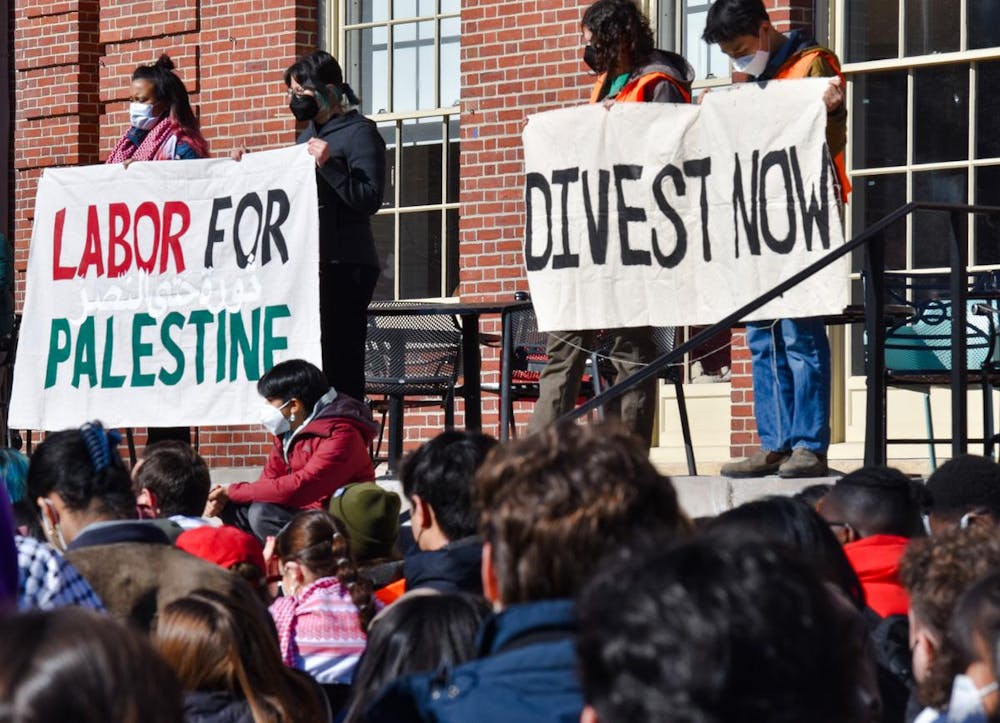The Graduate Labor Organization announced that it will spend the spring demanding that the University divest from companies facilitating the Israel-Palestine war in an Instagram post on Feb. 5.
According to GLO President Sherena Razek GS, the union’s decision to focus on divestment this spring came after “extensive discussions” among the “executive board of GLO and the organizing committee of GLO, which includes stewards from all the different workplaces and departments.”
The result of these conversations was “the unanimous decision that we cannot sit idly by while we watch an entire people face an extermination campaign and the total obliteration of the rights to education of Palestinian students and higher ed workers,” she added.
“This specific pledge for divestment is a specific request to our employer to divest from the war profiteering in Gaza,” Andrew Clark GS, the communications director for GLO, said in an interview with The Herald.
University Spokesperson Brian Clark wrote in an email to The Herald that “Brown’s endowment is not directly invested in any defense stocks or large munitions manufacturers,” a position that the University has emphasized since last fall.
The University is “confident that our external managers have the highest level of ethics and share the values of the Brown community, including the rejection of violence,” Clark wrote in a previous email.
“While our contracts with external investment managers have confidentiality provisions that prevent us from sharing what specific assets Brown’s endowment is invested in at any given time, our inability to disclose details does not indicate that we are invested in a specific holding,” he added. “The University has long-established principles for exploring the question of divestment. Any member of the Brown community can request that the University divest the Brown endowment from the assets of specific companies.”
As part of the campaign, GLO launched a pledge to raise graduate worker support for divestment and organized a teach-in “to move our members towards labor as an international solidarity project,” Razek told The Herald.
She described the pledge as a way of engaging GLO members and gauging interest in the campaign, in addition to providing information about how to “grow that campaign and build the pressure around it.”
GLO and Palestine Solidarity Caucus, created by GLO in 2021, also held a “Labor for Palestine” rally Feb. 7 in support of the students then on hunger strike. The rally featured speakers from GLO and other on-campus unions.
GLO joins a number of unions and union federations across the country, including United Automobile Workers, the American Federation of Teachers and the American Federation of Labor and Congress of Industrial Organization, in calling for a ceasefire in Gaza.
It is not unusual for unions to take political stances in the United States. In 2007, the American Federation of Labor and Congress of Industrial Organization — the largest union federation in the United States — called for the end of American military involvement in Iraq. In 1984, members of the International Longshore and Warehouse Union Local 10 staged a boycott protesting South Africa’s apartheid laws by refusing to unload shipments from South Africa. 1199SEIU — the largest healthcare labor union in the United States — stood as the first union to oppose the Vietnam War.
“As a graduate worker at Brown University, I’m committed to using my union to the ends for which all unions are intended — to improve the working conditions of all workers, including those in Gaza,” Devon Epiphany Clifton GS, a graduate worker in the English department, said at the rally.
History of GLO support for Palestine
This isn’t the first time GLO has pushed for divestment.
“It’s an issue that our membership has cared about for years,” Andrew Clark said.
In 2021, members of GLO formed the Palestine Solidarity Caucus within the union “for organizing grads towards Palestine solidarity and trying to situate why this was an issue or a matter that needed to be taken up by grad workers specifically,” Razek said. She added that the caucus opened up a referendum “to talk to members about where they stood in this situation and push further on this divestment campaign and oppose the unilateral authority of the University.”
According to Razek, 87% of GLO’s general membership voted in favor of divestment from “companies complicit in human rights abuses in Palestine” that same year.
“I don’t think we have to choose between our advocacy (for union workers) and our work in organizing around Palestine,” Razek added. “We have an obligation to do both.”
Divestment and graduate workers
Razek and Andrew Clark cited GLO’s demographics, the issue of higher education in Palestine and the historical solidarity between labor unions and global events as main motivations behind graduate workers’ engagement in divestment.
“We have Palestinian members of our union — I'm one of them — who are impacted,” Razek said. “Many of us have had our students arrested by the administration for their acts of principled civil disobedience opposing the ongoing genocide in Gaza.”
South Africa has claimed that Israel is enacting “acts and omissions” that are “genocidal in character … (against) the Palestinian national, racial and ethnic group.” On Jan. 24, the United Nations International Court of Justice Case ruled that Israel should “take all measures to prevent genocidal acts,” but did rule on the accusation of genocide itself.
Razek contrasted GLO’s role at the University with the situation of educators in Palestine.
“We cannot seriously call ourselves a labor union of higher education workers and be silent in the face of the total destruction of the university system in Gaza,” she said. Most universities in Gaza have been completely or partially destroyed since October.
Razek also emphasized the need to protect grad workers who do work or research about Palestine, citing “doxxing attacks and targeted campaigns aimed at educators at Brown.” She added that it’s “deplorable that Brown hasn’t come out to defend the professors and graduate students and postdocs working on Palestine.”
Brian Clark denied the latter claim in an email to The Herald. “Brown’s primary focus has been, and will continue to be, on supporting the needs and safety of our students, faculty and staff who are Israeli, Palestinian, Muslim, Jewish, have ties to the region and are feeling impacted by current event,” he wrote.
“The safety of our community is always a foremost priority,” he continued. “Brown continues to share information on support resources for students, faculty and staff, even as we have encouraged anyone in need of support to reach out.”
Participation from other student labor organizations
According to Razek, GLO has opened its pledge to signatories from other student worker unions in RIFT-AFT Local 6516, including the Teaching Assistants Labor Organization, the Labor Organization of Community Coordinators and the Brown Postdoc Labor Organization.
“If you’re a member of TALO, LOCC or BPLO and you care about divestment and holding your employer accountable too, you’re able to join us in doing that,” she added.
BPLO will also hold its own vote “to democratically decide what to do as a union in regards to this campaign,” Caroline Keroack, a postdoctoral research associate and organizer for the group, wrote in an email to The Herald.
Ethan Schenker is a university news editor covering staff and student labor. He is from Bethesda, MD, and plans to study International and Public Affairs and Economics. In his free time, he enjoys playing piano and clicking on New York Times notifications.

Katie Jain is a University News editor from New Jersey overseeing the graduate student life beat. She is a senior concentrating in International and Public Affairs and History.
Jennifer Shim was a University News editor at The Herald.





